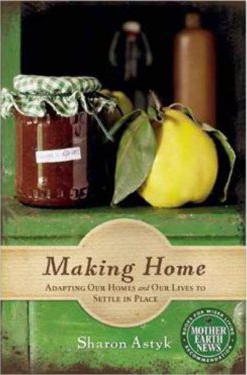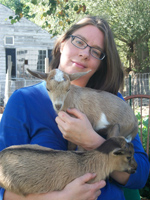
Making Home
 I reviewed Sharon Astyk's book Depletion
and Abundance a
couple of years ago, and since then I've fallen a bit out of love
with her blog. This often happens to me when a blogger
becomes repetitive, rehashing the same information over and over
--- it's interesting the first time, but not thereafter.
Still, I thought it was worth a shot to read her newest book, Making
Home.
I reviewed Sharon Astyk's book Depletion
and Abundance a
couple of years ago, and since then I've fallen a bit out of love
with her blog. This often happens to me when a blogger
becomes repetitive, rehashing the same information over and over
--- it's interesting the first time, but not thereafter.
Still, I thought it was worth a shot to read her newest book, Making
Home.
Astyk's thesis is
that Peak Oil will result in a very different world from the one
we now know. The book revolves around the idea of adapting
in place --- choosing a spot where you want to put down roots,
then making changes immediately so you won't be so hard hit when
the consequences of Peak Oil begin to be felt more widely.
As you might expect, the book gets a bit Doomy, especially in the
second half, but if you don't mind wading through that, you'll
find some handy information on emergency preparedness and
homesteading, especially from a social perspective.
On the other hand,
much of the information would be hard for us to put into
practice. Astyk is part of a relatively tightly-knit Jewish
community, and she and her husband have four kids plus an
ever-shifting number of foster kids. If you don't have a
faith-based community to fall back on, and don't have children,
you might as well skip about a third of the book and likely won't
find any community-building information that will appeal to you.
 On the other hand,
Astyk's housing advice is more spot-on from our Trailersteading perspective. When
she and her husband were house-hunting, Astyk considered moving
into an Amish-built house (with the lack of electricity and other
facilities that you'd expect). She felt (as I do) that it's
much easier to start with nothing and slowly built more
sustainable workarounds than to move into a modern American house
and try to go backward. Her husband rebelled against the
Amish house, but they both seem content with living in what Astyk
calls a "working home" instead of a "show home," one that produces
rather than consumes. "[American] standards of cleanliness
and perfection can be so high," she wrote, "precisely because
homes are expensive spaces in which we do not ordinarily live."
On the other hand,
Astyk's housing advice is more spot-on from our Trailersteading perspective. When
she and her husband were house-hunting, Astyk considered moving
into an Amish-built house (with the lack of electricity and other
facilities that you'd expect). She felt (as I do) that it's
much easier to start with nothing and slowly built more
sustainable workarounds than to move into a modern American house
and try to go backward. Her husband rebelled against the
Amish house, but they both seem content with living in what Astyk
calls a "working home" instead of a "show home," one that produces
rather than consumes. "[American] standards of cleanliness
and perfection can be so high," she wrote, "precisely because
homes are expensive spaces in which we do not ordinarily live."
Astyk's take on
finances was also interesting. Of course, she recommended
that you prioritize getting out of debt, hypothesizing that debt
will be harder to deal with in the future than it is now.
But what if you have money to invest
for retirement?
Astyk believes that gold and silver will actually lose value, and
she (not entirely tongue-in-cheek) recommends investing in
alcohol, prescription sedatives, porn, and escapist videos
instead. More seriously, she recommends that we try not to
look at money as the only means to an end, and to focus on the end
itself. What will we need in the future, and what can we
spend time or money on now to prepare for that?
In the end, I felt Making Home was a
thought-provoking read, but I was thrown off by the internetisms
that popped up (smileys in a print book?) and by the word-for-word
reprints of articles I'd already seen on her blog. I'm also
a bit leery of the whole premise of the book --- yes, I believe in
Peak Oil, but I don't really believe we can predict what the
future looks like, and I also don't like the idea of planning your
life out of fear. Why not focus on being more sustainable
and self-sufficient for the joys it brings now, rather than
because it may or may not make your future easier than your
neighbors'? Despite my complaints, though, the book is well
worth a read, and is light enough to make fast summer reading.
Want more in-depth information? Browse through our books.
Or explore more posts by date or by subject.
About us: Anna Hess and Mark Hamilton spent over a decade living self-sufficiently in the mountains of Virginia before moving north to start over from scratch in the foothills of Ohio. They've experimented with permaculture, no-till gardening, trailersteading, home-based microbusinesses and much more, writing about their adventures in both blogs and books.
Want to be notified when new comments are posted on this page? Click on the RSS button after you add a comment to subscribe to the comment feed, or simply check the box beside "email replies to me" while writing your comment.

I found her previous works to be much more practically useful in the sense of ideas of how to adapt your lifestyle now instead of later.
I also found her blog more useful, the older stuff, than any of her books. That said, her blog is now off-line and has been for half a year. Her blog at national geographic has been sparse.
And yes, the fear based stuff gets to me. The "goal based" challenge yourself to see how little you can use and how you can enrich your life now is much more practically valuable and fun.
Worrying about Peak Oil is so yesterday. Natural gas, of which we now have 1000 yrs worth, can be used as fuel just as easily & efficiently (actually cheaper) than liquid petroleum fuel.
OTOH- there's still the real risk of a great chaos to come when nobody will loan the govt any more money and the welfare checks will stop coming in the mail. The self-reliant will have a greater chance of surviving in the New Dark Ages.
"I don't really believe we can predict what the future looks like" +1